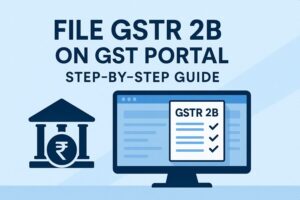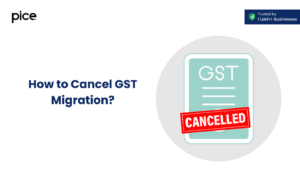Cancellation of GST Registration
- 3 Sep 24
- 13 mins

Cancellation of GST Registration
- Definition of GST Registration Cancellation
- Who is Eligible to Cancel GST Registration?
- Who is Ineligible for GST Registration Cancellation?
- Scenarios Where GST Registration Can Be Cancelled
- Consequences of GST Registration Cancellation
- Forms Used for Cancelling GST Registration
- Required Information for Filing GST Registration Cancellation
- Process for Cancelling GST Registration
- What is Revocation of Cancellation?
- When is Revocation of Cancellation Applicable?
- Procedure for Revocation of Cancellation
Key Takeaways
- GST registration cancellation can be initiated by the taxpayer, tax officer, or legal heirs.
- Cancellation of GST registration requires filing a final return and settling any outstanding tax liabilities.
- Tax officers can cancel GST registration suo moto if a taxpayer fails to comply with GST regulations.
- Revocation of cancellation is possible within 30 days if the registration was cancelled unjustly.
- Understanding the consequences and required procedures is essential before cancelling GST registration.
Cancellation of GST registration is a crucial aspect of the Goods and Services Tax (GST) framework in India. It involves the termination of a registered taxpayer's GST registration, which could be initiated by the taxpayer themselves, the tax authority, or in some cases, by the legal heirs of the taxpayer. The cancellation of GST registration can have significant implications for businesses, including the need to settle any pending tax liabilities and ensure proper compliance with GST regulations.
Definition of GST Registration Cancellation
GST registration cancellation refers to the process of nullifying the GST registration of a taxable person, rendering them no longer liable to collect and remit GST. This process is applicable in situations where the registered person ceases to conduct business operations, undergoes a change in business structure, or meets other criteria defined by the GST law. Once the cancellation is effective, the taxpayer must file a final return and pay any remaining tax liability, ensuring that no further transactions are made under the cancelled registration.
The process of cancellation is initiated through an application for cancellation filed via the GST portal. The registered person or the tax officer responsible for the taxpayer's jurisdiction can initiate the cancellation proceedings. A show-cause notice is typically issued to the taxpayer, giving them an opportunity to respond and present their case before the proper officer finalizes the cancellation. Understanding the implications of cancellation and ensuring compliance with the necessary procedures is essential to avoid potential legal and financial complications.
Who is Eligible to Cancel GST Registration?
GST registration can be cancelled by various entities, including the taxpayer themselves, the tax officers, or, in certain situations, the legal heirs of a deceased taxpayer. The eligibility to cancel GST registration largely depends on the circumstances surrounding the taxpayer's business operations.
GST Cancellation Initiated by the Taxpayer
A taxpayer can voluntarily initiate the cancellation of their GST registration for several reasons. This includes the closure of business, the transfer or amalgamation of the business to another entity, or when the taxpayer's turnover falls below the threshold limit required for GST registration. The process requires the taxpayer to submit an application for cancellation via the GST portal, providing all necessary details and supporting documents. The application is then reviewed by the tax officer, who may either approve or reject the cancellation request based on the provided information.
GST Cancellation Initiated by Tax Officers
In certain cases, tax officers have the authority to initiate the cancellation of a taxpayer's GST registration. This often occurs when the taxpayer fails to comply with GST regulations, such as not filing GST returns for a continuous period, issuing tax invoices without conducting actual supply, or violating other GST provisions. The tax officer issues a show-cause notice to the taxpayer, allowing them to respond before proceeding with the cancellation. This ensures that the cancellation is carried out in a fair and transparent manner, with the taxpayer having the opportunity to address any discrepancies.
Reasons a Taxpayer May Want to Cancel Registration
Taxpayers may wish to cancel their GST registration for various reasons. The most common reason is the discontinuation of business operations, where the taxpayer no longer engages in taxable supplies or business activities. Other reasons include the transfer of business ownership to another party, the taxpayer's decision to opt out of voluntary registration, or the merging or splitting of business entities. Additionally, if a taxpayer's annual turnover falls below the prescribed threshold for GST registration, they may choose to cancel their registration to avoid unnecessary compliance burdens.
GST Cancellation Requested by Legal Heirs
In unfortunate circumstances where a registered taxpayer passes away, the legal heirs may request the cancellation of the deceased's GST registration. This is particularly relevant in cases where the business was solely owned by the deceased, such as in a proprietorship firm. The legal heirs are required to submit an application for cancellation, along with the necessary documentation to prove their relationship to the deceased and their authority to act on behalf of the estate. This ensures that the GST registration is appropriately closed and that the estate is not held liable for any future tax obligations.
Who is Ineligible for GST Registration Cancellation?
Not all registered persons are eligible for the cancellation of their GST registration. Certain categories of taxpayers, such as non-resident taxpayers, Input Service Distributors (ISDs), and taxpayers under the Composition scheme, may have restrictions or conditions that prevent them from cancelling their registration. These restrictions are in place to ensure that the tax authority can effectively monitor and manage the compliance of these taxpayers.
For example, non-resident taxpayers are typically required to maintain their registration for a specific period, even if they cease business operations within India. Similarly, taxpayers under the Composition scheme may be restricted from cancelling their registration if they have not met the compliance requirements for filing GST returns or settling their tax liabilities. It is important for taxpayers to understand these restrictions and consult with a tax professional if they are uncertain about their eligibility for cancellation.
Scenarios Where GST Registration Can Be Cancelled
GST registration can be cancelled under various scenarios, depending on the entity initiating the cancellation and the circumstances surrounding the business operations.
Tax Officer – Suo Moto Cancellation
Suo moto cancellation refers to the cancellation initiated by the tax officer without a request from the taxpayer. This often occurs when the taxpayer has not complied with GST regulations, such as failing to file returns for a continuous period, conducting fraudulent activities, or not adhering to the conditions of voluntary registration. In such cases, the tax officer issues a show-cause notice, giving the taxpayer an opportunity to respond before proceeding with the cancellation.
Taxpayer – Voluntary Cancellation
Taxpayers may voluntarily request the cancellation of their GST registration for various reasons, such as the closure of business, business transfer, or if their annual turnover falls below the mandatory registration threshold. The taxpayer must submit a cancellation application through the GST portal, providing details such as the reason for cancellation, stock details, and any outstanding tax liabilities. The proper officer reviews the application and may request additional information before approving the cancellation.
Legal Heirs
Legal heirs may request the cancellation of a GST registration when the registered taxpayer has passed away. This process involves submitting an application for cancellation, along with documents proving the relationship to the deceased and their authority to act on behalf of the estate. The cancellation ensures that the deceased's estate is not held liable for future tax obligations and that the GST registration is appropriately closed.
Consequences of GST Registration Cancellation
The cancellation of GST registration has several consequences for the taxpayer. Once the registration is cancelled, the taxpayer is no longer liable to collect and remit GST, and any input tax credit remaining in the electronic credit ledger must be reversed. The taxpayer must also file a final return, known as Form GSTR-10, which includes details of the closing stock and any tax liability on the goods held at the time of cancellation.
Moreover, the cancellation of registration may impact the taxpayer's business operations, as they will no longer be able to issue tax invoices or participate in the GST system. This can have implications for their supply chain, business relationships, and overall compliance with tax laws. It is crucial for taxpayers to carefully consider the consequences of cancellation and ensure that they meet all compliance requirements before proceeding with the cancellation.
Forms Used for Cancelling GST Registration

Several forms are used in the process of cancelling GST registration. The most common form is GST REG-16, which is used by taxpayers to apply for cancellation of their registration. This form requires the taxpayer to provide details such as the reason for cancellation, the date of cancellation, and the details of any outstanding tax liabilities. The taxpayer must also submit supporting documents, such as the final return (Form GSTR-10) and stock details.
In cases where the tax officer initiates the cancellation, Form GST REG-17 is issued as a show-cause notice to the taxpayer, giving them an opportunity to respond and present their case. If the cancellation is approved, the tax officer will issue Form GST REG-19, which serves as the official cancellation order. It is important for taxpayers to familiarize themselves with these forms and ensure that they are completed accurately and submitted within the prescribed time limit.
Required Information for Filing GST Registration Cancellation
When filing for the cancellation of GST registration, taxpayers must provide various pieces of information to ensure that the cancellation process is smooth and compliant with GST regulations. This includes basic information such as the GSTIN (GST Identification Number), the legal name of the business, and the reason for cancellation.
Additionally, taxpayers must provide details of their closing stock, including the stock of inputs, capital goods, and any input tax credit claimed on these items. The taxpayer must also submit a final return, known as Form GSTR-10, which includes details of any outstanding tax liabilities and the payment of taxes due. Proper documentation, such as the submission of the cancellation application, supporting documents, and any correspondence with the tax authority, is crucial to ensure that the cancellation is processed without delays or complications.
Process for Cancelling GST Registration
The process for cancelling GST registration involves several steps, beginning with the submission of a cancellation application by the taxpayer or the initiation of cancellation proceedings by the tax officer. The application for cancellation must be filed through the GST portal, where the taxpayer provides details such as the reason for cancellation, the date of cessation of business, and the closing stock details.
Once the application is submitted, the tax officer reviews the information and may issue a show-cause notice if there are any discrepancies or if additional information is required. The taxpayer is given an opportunity to respond to the notice and provide any necessary documentation. If the cancellation is approved, the tax officer issues a cancellation order, and the taxpayer is required to file a final return (Form GSTR-10) to settle any outstanding tax liabilities.
What is Revocation of Cancellation?
Revocation of cancellation refers to the process of reinstating a previously cancelled GST registration. This option is available to taxpayers who believe that their registration was cancelled incorrectly or who have resolved the issues that led to the cancellation. The revocation process allows the taxpayer to continue their business operations under the same GSTIN and ensures that they remain compliant with GST regulations.
The revocation process must be initiated within a specific time limit, typically within 30 days of the cancellation order. The taxpayer must submit an application for revocation through the GST portal, providing details such as the reason for revocation, any supporting documents, and a response to the cancellation order. If the application is approved, the tax officer will issue an order revoking the cancellation and reinstating the taxpayer's GST registration.
When is Revocation of Cancellation Applicable?
Revocation of cancellation is applicable in cases where the taxpayer's GST registration was cancelled by the tax officer, and the taxpayer believes that the cancellation was unjustified or based on incorrect information. It is also applicable when the taxpayer has resolved the issues that led to the cancellation, such as filing overdue GST returns, settling outstanding tax liabilities, or correcting any discrepancies in their business operations.
The revocation of cancellation is a crucial option for taxpayers who wish to continue their business operations and avoid the legal and financial implications of a cancelled registration. It is important for taxpayers to act quickly and submit the revocation application within the prescribed time limit to ensure that their registration is reinstated without delays.
Procedure for Revocation of Cancellation
The procedure for revocation of cancellation involves several steps, starting with the submission of an application for revocation through the GST portal. The taxpayer must provide details such as the reason for revocation, any supporting documents, and a response to the cancellation order issued by the tax officer.
Once the application is submitted, the tax officer reviews the information and may request additional documentation or clarification. If the application is approved, the tax officer issues an order revoking the cancellation and reinstating the taxpayer's GST registration. The taxpayer must then comply with any conditions set by the tax authority, such as filing overdue returns or settling outstanding tax liabilities, to ensure that their registration remains active and in good standing.
In conclusion, the cancellation of GST registration is a significant process that requires careful consideration and compliance with GST regulations. Taxpayers must understand the eligibility criteria, the scenarios where cancellation is applicable, and the consequences of cancellation before proceeding with the process. Additionally, the option for revocation of cancellation provides an important safeguard for taxpayers who wish to continue their business operations and remain compliant with GST laws.
 By
By 

















